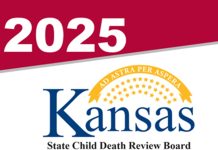Good morning everyone:
A comparatively sedate week under our belt with a new internal Democratic poll out about the governor’s race, more moderate Republicans backing Democratic Sen. Laura Kelly and decisions to keep House candidate Adam Thomas and Secretary of State Kris Kobach on the ballot.
We’re now seven weeks and three days away from the Nov. 6 general election, which is basically the start of college hoops season. Let’s take a look at some news you might have missed last week.
New poverty numbers
The U.S. Census Bureau released some new numbers showing that the overall number of people living in poverty is down in Kansas but has climbed for children.
The Census Bureau last week reported that 336,487 Kansans, or 11.9 percent of the population, were living below the poverty level in 2017. 
It was a slight improvement from 2016, when 342,544 Kansans, or 12.1 percent of the population, lived below the poverty line.
Go back to 2013, and there were 393,358 Kansans, or 14 percent of the population, living in poverty.
Children under 18 living in poverty was another matter in 2017. That number increased in 2017 to 103,689 from 99,323 the year before.
It was down from 2013, when 132,460 Kansas children under 18, or about 19 percent of that age bracket, lived in poverty.
Nevertheless, the increase in 2017 grabbed the attention of Kansas Action for Children, which believes the number should be improving given the robust economy.
“In short, a lengthy economic recovery and record low unemployment aren’t benefiting a substantial number of our state’s children,” the group said in a statement it tweeted out last week.
New York Times/Siena College poll gives Davis slight nod
For those not glued to your computer over the weekend, Democrat Paul Davis edged Republican Steve Watkins in a unique live poll done by the New York Times in partnership with Siena College.

The poll of 500 voters — where you could watch the results flow in live — gave a slight nod to Davis, leading 45 percent to 44 percent.
The final results were well within the 4.8 percent margin of error. Twelve percent of those polled in the 2nd Congressional District race were undecided.
Remember, President Donald Trump carried the 2nd Congressional District by 18 points in 2016, and Mitt Romney won it by 13 in 2012.
The poll showed Davis with a 37 percent favorable rating and a 27 percent unfavorable rating, while 36 percent didn’t know. Watkins’ favorables were at 21 percent, while his unfavorables were at 26 percent. Fifty-three percent didn’t know.

Among those polled, 48 percent approved of Trump while 45 percent disapproved. Seven percent were unsure.
Forty-nine percent wanted to see the House remain Republican while 41 percent wanted to see the Democrats take control. Ten percent were unsure.
Thirty percent supported eliminating Immigration and Customs Enforcement, while 58 percent opposed. Twelve percent of the voters were unsure.
Fifty-two percent supported a federal ban on the sale of assault-style guns and high-capacity magazines. Forty-two percent were opposed, and 7 percent didn’t know.
Davis visits Pittsburg
In other 2nd District news, here’s a piece from the Pittsburg Morning Sun about Democrat Paul Davis’ trip to southeast Kansas to talk with local health care professionals.
KPI polls on taxes, education
In the spirit of providing the most complete report on state politics as possible, we give you this poll that the Kansas Policy Institute released last week on taxes and education.
Remember, it’s our mission to give you everything that’s out there and let you decide what’s important and what’s not.
The KPI poll of 514 registered voters, done by SurveyUSA, asks a couple of interesting questions on taxes, including one about whether Kansas should return the revenue windfall it received because of changes in the federal tax code.
Sixty-nine percent said they supported returning the windfall, 16 percent opposed and 15 percent were unsure.
In another question on balancing the budget, 63 percent said they supported balancing the budget without highway fund transfers and delays in funding other areas such as pensions.
The poll was done Aug. 29 through Sept. 1.
Immigration and the governor’s race
The Associated Press’ John Hanna looks at Republican Kris Kobach’s promise to save the state from spending hundreds of millions of dollars on undocumented immigrants if he’s elected governor. Hanna looks at how Kobach’s immigration policies might affect the state and whether Kobach can save as much as he says. Worth a read.
Debating debates
Democrat Alan LaPolice and Republican Congressman Roger Marshall are squabbling over a forum planned for Oct. 9 in Abilene that the incumbent doesn’t plan to attend. We turn to the Abilene Reflector-Chronicle where Marshall’s chief of staff refers to LaPolice as “wacky Alan,” adding he can have the forum “to himself to weave his usual tapestry of conspiracy theories.”
Transparency fading?
The 2018 legislative session isn’t over six months and there is already a sign that new transparency laws are already being set aside.
The Topeka Capital-Journal has this story where the Kansas Press Association attorney is questioning whether a new agreement between the city of Topeka and the police union conflicts with a new state law opening up body camera footage.
The C-J reports that the new contract says video from body cameras or patrol vehicles won’t be made public for 60 days unless the employee, the union and the city agree to an earlier release.
A state law enacted this year requires authorities to make body camera footage available to victims’ families or their representatives within 20 days of a request.
Internet sales tax news
For those following along in anticipation of the 2019 legislative session, we have some news about internet sales taxes, this time with a bill introduced in Congress to stop retroactive taxation.
Introduced Friday, the bill backed by Republican Congressman Jim Sensenbrenner of Wisconsin would ban states from collecting taxes on remote sales before the U.S. Supreme Court allowed taxes on internet purchases. It also would provide a temporary $10 million exemption for small businesses. Here’s the story from Reuters.
For more information, here’s the press release from Sensenbrenner’s office and statements on the legislation from the National Taxpayers Union and the Competitive Enterprise Institute.
Farewell Tom Robinett
Overland Park Chamber of Commerce lobbyist and former state Rep. Tom Robinett will be retiring at the end of November.
He plans to immediately turn to honing his golf and pool games while devoting more time to his grandchildren.

As the chamber’s vice president of public policy and advocacy, Robinett coordinated all political and governmental activities for the organization.
Before joining the chamber, he served as general counsel of the American Academy of Family Physicians, associate general counsel for Applebee’s International, and was a partner with the law firm of Lewis, Rice & Fingersh.
He currently serves on the board of trustees of Menorah Medical Center, the Overland Park Planning Commission and the advisory board for United Community Services of Johnson County.
Yoder and the FEMA diversion
Republican Congressman Kevin Yoder caught some flak last week over a decision to transfer $10 million from the Federal Emergency Management Agency to Immigration and Customs Enforcement. As chair of a key Homeland Security subcommittee, he is one of two people who can sign off on that transfer.
Yoder’s folks say the money transferred to immigration enforcement was earmarked for administrative expenses, not disaster relief. Democratic challenger Sharice Davids, who’s been attacked in ads for wanting to abolish ICE, called Yoder a “yes man” for Trump and an extremist. Here’s the coverage from KCUR and KMBC.
Transportation task force leftovers
Some not-so-random facts presented at last week’s transportation task force meeting in Kansas City, Kan.:
About 320 million tons of commodities were moved by highway, rail and air in Kansas in 2014. A bulk of that — 259 million tons — were moved on highways. The overall tonnage is expected to increase to 412 million by 2040 with 347 million tons transported by highway.
Almost $300 billion in commodities were moved by road, rail and air in 2014. That’s expected to increase to $435 billion by 2040.
Something to chew on this Sunday.













